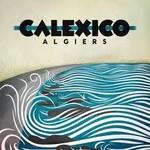
Calexico Algiers
(ANTI)
Over the course of their career, Calexico have always been able to create meticulously detailed worlds for their songs to inhabit. It seems as though drawn out steel guitar notes and mournful tones of trumpets and accordions can develop into entire landscapes in their hands. If there has been a constant in their time as a band, it’s been this ability to take the listener and drop them into a fully realized and completely believable musical environment that stretches across however many tracks any particular album runs. In fact, one of the band's greatest strengths is their ability to develop a tangible sense of time and place on their records. And on Algiers, Calexico's newest album since 2008's Carried To Dust, they’ve succeeded brilliantly, but the band reaches for, and exudes, a far greater confidence and maturity than we've ever heard on previous records. Feast Of Wire still stands as their most accomplished album, but Algiers makes a good run at being its spiritual successor.
In what could be said to be arrogance or perhaps hubris—but proves to be neither—the band opens the album with a track called Epic, a surging, of-course-it’s-Calexico track that builds slowly around mounting electric guitars and a beautifully intertwining harmony, which draws the listener into its curious tale of “hearts holding out waiting for the bells”. It’s a hauntingly ruminative track which brings to mind the material from their earlier albums such as Spoke or The Black Light. And as the last few notes fade away, you know exactly where you stand in relation to the music, and you’re already enraptured by the scenery. But the band doesn’t give us much time to catch our breath as follow-up Splitter takes off and rushes us along as we try to take in the now blurry view. Under repeated refrains of “holding on to no one”, the band laces an insistent vibraphone among jolts of horns and chugging guitars and creates a natural keel that guides the song along to its end.
Lead single Para starts slowly, twisting around a stuttering beat and singer Joey Burns’ confident voice, but soon rises and expands until the chorus explodes amid stabs of trumpet and easily sweeps the listener along. It’s strange to think that Burns sounds even better here than on previous albums, as his voice has always been one of the focal points of their songs, but this record just seems to bring out some inner reservoir of strength and vitality in the man. It really is astonishing to hear him. The same can be said for drummer and Calexico co-founder John Convertino, whose prominent, though never ostentatious, beats assertively direct each song and play a crucial role in maintaining the flow of the album. His influence is apparent on tracks such as the Latin-influenced, instrumental Algiers and Sinner in the Sea, with its languorous musical swells and ominous grace. A highlight on the album, the shuffling rhythm of Sinner carries the listener over its waves, lost among languid horns and a melody so serpentine that it seems to be in constant motion for fear that its own movement is the only thing keeping it alive.
Unlike so much recent music misappropriation—such as 80’s synth-pop or early 90’s R&B—Calexico have never deviated from their basic musical tenants. Whether it’s the physical rhythms of cumbia or brass-tinged mariachi stylings, this music which bears such a heavy influence on them has been continually embraced across their entire discography. This isn’t merely an issue of a band co-opting a particular sound for an album and then carelessly discarding it in favor of another musical trend. It seems to be an innate part for the band. This is who they are; they just happened to throw in some indie bits and pieces for good measure.
As much as I am loath to admit it, prior to Algiers, I think that I had begun to take Calexico for granted. I loved their early records and fell hard for Feast Of Wire, but over their next few records, I started to cultivate certain expectations, and as their albums never really disappointed, I grew complacent in my appreciation. Of course it’s going to be good. It’s a Calexico record, right? But in my assumptions, it seems that I’d forgotten what made them so unique. Any band can add Latin brass and mariachi guitars and feel as though they’re saying something interesting and new, but few bands ever manage to pull this off without sounding as though they’re bound by a very specific set of guidelines. The casual ease and nonchalance with which Calexico create songs within this context is a testament to their already considerable proficiency and abject love of this music.
Calexico take the dusty, border-town vibe and expand it until it seems to be on the verge of bursting. And on Algiers, they do so with a greater confidence than on any album in recent memory. It’s not just that the melodies are stronger (they are) or that the band is playing better than they have in years (again, true), but the whole album feels more self-assured, and Joey Burns and John Convertino have never sounded better. If there was any doubt that the band could match the creativity and sustained inspiration of Feast Of Wire, this record will cast those doubts aside. Algiers is immense, genuine, and, at times, heartbreakingly beautiful. What more could I ask for from these guys.
28 September, 2012 - 09:20 — Joshua Pickard